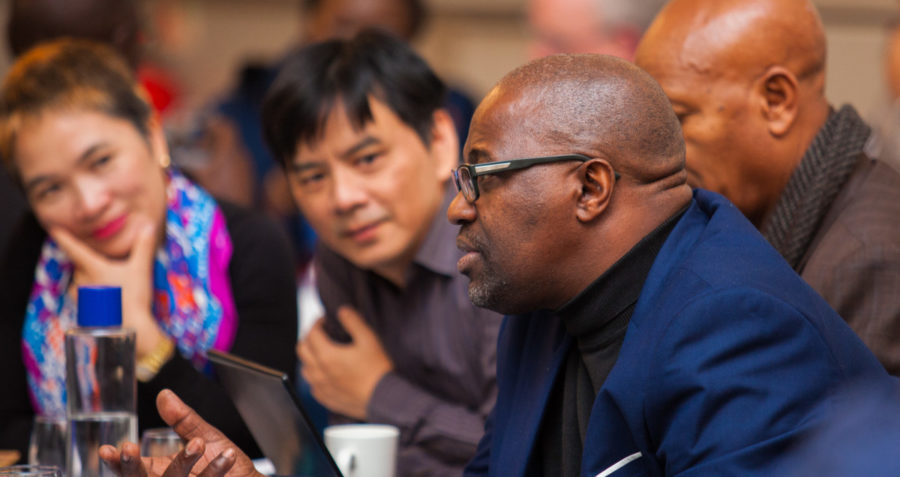Leading from the frontline
 Frontline AIDS/Gemma Taylor 2018
Frontline AIDS/Gemma Taylor 2018
Ahead of Africa’s largest conference on HIV, three Frontline AIDS partners share perspectives on why partnerships are needed now more than ever to sustain the HIV response.
More than 100 civil society organisations make up the Frontline AIDS global partnership and they come in all shapes and sizes. But what unites them is that each is a leader in its own right.
Take for example the Coordinating Assembly for NGOs (CANGO) in Eswatini which, although a relatively small organisation, punches well above its weight by acting as an umbrella to around 70 NGOs working on HIV, gender, children and young people, food security and nutrition, non-communicable diseases, and sexual and reproductive health and rights (SRHR).
Or the South African-based REPSSI which works across the region to integrate psychosocial work within the development sector, including HIV, child protection and gender-based violence programmes. Both REPSSI and CANGO are partners in the READY portfolio of programmes which are designed by, and centred around the needs of, young people.
And not forgetting long-standing partners like the Alliance Nationale des Communautés pour la Santé (ANCS) that was set up to support and strengthen the community response to HIV in Senegal, and – like CANGO – is a Global Fund Principal Recipient.
Here, ANCS’ technical director Massogui Thiandoum, REPSSI’s Chief Executive Officer Patrick Onyango Mangen and CANGO’s Executive Director Emmanuel Ndlangamandla reflect on why being part of partnerships like Frontline AIDS is more critical than ever, particularly during the ongoing impact of COVID-19.
Pulling each other up
Massogui: The Frontline Global partnership has benefits at several levels. Firstly, it represents a critical mass of practitioners who can help accelerate the global HIV response. Secondly, by sharing our knowledge, expertise and experiences, we can be much more effective and efficient in our interventions. Thirdly, we’re also a contributing force to be listened to that can influence decisions at an international and global level.
Emmanuel: The partnership model is very exciting because it creates this sense of security. Even though I come from a very small country, I’m comfortable to work with bigger players. In articulating our views, we don’t feel inadequate. There is this idea of pulling each other up, that is the essence of what partnership is.
Patrick: We prefer partnerships where we hone our skills, acquire and exchange new knowledge. And with Frontline AIDS, we feel that our input is valued, that we are sufficiently consulted when developing the programmes, and that there is an exchange of information which is really important for us as a southern-based organisation.
Keeping up the momentum
Patrick: It’s important to keep profiling the issues relating to HIV which are still immense. Coupled with the whole COVID-19 pandemic, families are getting debilitated. We have to keep the momentum around HIV and keep putting it on the global agenda.
Massogui: COVID 19 allowed us to see more clearly the inequalities within the health system and how that impacted certain populations. A lot of donors adapted their funding mechanisms for us to be able to address the urgency of situations that developed because of COVID-19. But one consequence of this is that funds destined for the HIV response went to COVID-19 which creates a gap, so a lot more resources need to be mobilised to be able to respond to the HIV epidemic as well as to prepare for future pandemics.
Emmanuel: During COVID-19, the Frontline AIDS partnership was gathering information on the ground in order to bring evidence to bear in advocacy and engagement with policy makers at a global level. It’s critical to continue on this path. We need to make sure that resources are always there for the HIV response so that there’s sustainability of action.
A bigger voice
Emmanuel: We [at CANGO] are working in a very small country but now we are reaching the global space. That on its own is enriching because we are also contributing to the broader understanding of HIV issues, like the impact that it is having on young girls and adolescents, and discrimination issues, particularly for the LGBTI community.
Massogui: We need to strengthen our visibility. Donors and other stakeholders need to be able to see our shop window, so to speak, to appreciate the dynamism and strength of the partnership. That will help us to advocate at a national level and serve communities better.
Patrick: This partnership raises our profile in the sector, and we are able to reach out to different stakeholders who hitherto wouldn’t have known about what we were doing.
Emmanuel: The partnership model has taught us that we need to establish relationships with trade unions, with faith-based communities, with key populations, with young people. When we work together, we have a bigger voice. If we bring evidence to the table, policy makers cannot dispute our call for change.
Shared leadership
Patrick: Frontline AIDS recognises REPSSI as a leader in the provision of mental health and psychosocial support and looks up to us as such. The approach they are taking is consultative and inclusive. It is slow but deliberate and is making sure that, as we move towards more established partnership structures, everybody is in agreement with the process
Massogui: The distributed leadership model indicates an evolution in the partnership because at the beginning, we were accountable to Frontline AIDS. Now, we’re an actor on the same level, so we share roles and responsibilities within the global strategy. That makes us feel valued because we’re in an equal partnership.
Emmanuel: Shared leadership comes in terms of the realisation that in the different parts of the world where we operate, we are also leaders in our own space. As CANGO, I’m a leader, I have influence. We are respected by the government, by the donors, the UN and others. With that influence from the micro to the macro, there is an even bigger influence when you aggregate that.
Tags
Partnership

